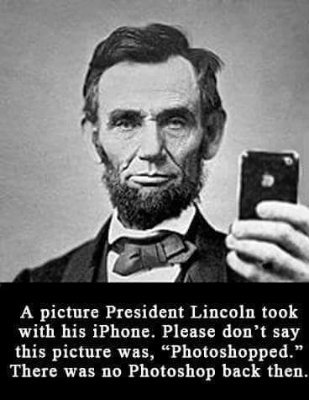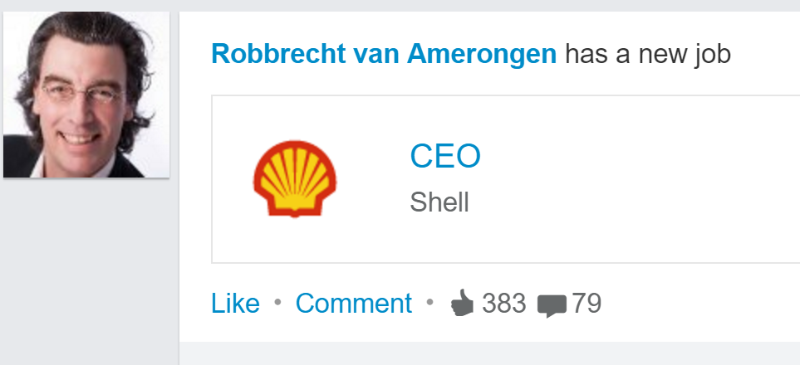A few weeks ago I “switched” my current role to CEO at one of the world’s largest corporation. With this experiment, I wanted to test my assumption that people would critically assess the authenticity of information shared on this social network. Here is what happened next.
This article has originally appeared on LinkedIn.
For my business, a network like LinkedIn is a valuable resource for sales, recruitment, and business development.
This is the place where I find my peers, learn about the interesting background and common interests of the people I do business with. And I receive frequent updates about career changes and company news, too.
The value of this network is encapsulated in the accuracy of the information stored within the network. I wanted to test how deeply rooted the users of LinkedIn trust the information on this network. How do we know what information on LinkedIn is correct, accurate and complete?
Most of us completely trust the information shared on LinkedIn
I noticed that there is a huge level of trust in the accuracy of LinkedIn profiles. When you compare LinkedIn to Twitter, Facebook or Instagram, you can notice that LinkedIn users tend to post more serious posts and correct details about themselves.
On Twitter, I can be “CyberGoofbal83” and post all kinds of random facts and lies just to amuse my followers.
On Facebook, we tend to be partly serious and humorous. When I changed my place of birth to LEGOLAND, Denmark and current location to “Eifel Tower, Paris”, I got two “LOL” comments and that was it.
LinkedIn is perceived as a more reliable source of information. However, the check for accuracy of the information is similar to Facebook. The idea behind LinkedIn is probably that the network is self-regulating and self-cleaning. Inaccurate information is noticed by peers and the community governs the accuracy of your information.
This is a nice theory, but the practice is open to deviations.
Here’s a quick summary of my experiment:
I changed my Job title and employer overnight from “Manager Development of AMIS” to “CEO of Shell”
The following things happened:
- I received almost 400 likes and 80 comments.
- I got more than 500 emails with a personal message.
- 10 of my closest co-workers called within 2 hours.
- I got over 20 text messages.
- I spontaneously received 10 CVs and requests for a job at my new company.
- 2 offshore companies sent me an email to get an appointment as soon as possible.
All that happened in the first 2 days after my job transition.
Even though the experiment took place 3 months ago, I still meet people who refer to this micro-event. It definitely got noticed and most of them were surprised by the update, it got them thinking.
I was expecting that most of my contacts would grasp the humor behind this. I was blown away by the diversity of the responses I got and the number of people who were convinced that I was the new CEO at this multinational.
This experiment reveals a fascinating perspective of the LinkedIn experience of some of my contacts.
Here are several insights that can be inferred from the comments that I received:
Acceptance
“Of course, a company like Shell is hiring an IT guy as CEO since all companies are transforming to IT companies. This is a wise decision of a company like Shell. And I am sure you can do the job”.
Corrective
“Please take of this update. LinkedIn is a serious network and you are not being professional. This is no place for jokes. This is not a place to joke around and you are compromising the trust I put into the quality of this network”.
Checking
“I am puzzled; you seemed like a pretty environmental conscious guy. Are you sure you are going to work for a company that has a debatable environmental track record.” “Are you sure you are making this move? Congratulations, a huge step forward. Be prepared for a tough job.”
Anger
“I cannot believe someone choosing to work for a company like this. This company is destroying our world and now you are going to be a part of it.”
This was one of the kind responses. I also received vicious and very explicit feedback about the fact that I was working for this company (not suitable for posting here).
Opportunistic
“Congratulations on your new role as CEO. Please find my CV attached and I am happy to visit your office for an interview. You can find my contact details below”.
Very sales driven response:
“We are a small offshore engineering company developing an innovative and specialized deep sea drilling solutions. We would appreciate it if you could review our fact sheet and meet us in a video conference next week”.
Humor
And I was glad to receive a lot of positive and humoristic responses.
Ranging from “Can you give me a discount next time I visit the gas station?”; “We already see the effect on the stock prices!” and “All the best with the move to sustainable energy sources”.
The long ripple effect of this update
The effect was huge; even though I removed the position the next day.
After 4 days most of my contacts got an email from LinkedIn with the advice to congratulate me and contact me to catch up for the benefit of their own career. My profile views spiked to 10 times the normal number of visitors.
And still, every week at least 3 people remind me of this event. The update mentioning “my new job” was actively shared for almost 4 weeks and rose till about 380 likes. I gained about 250 new connections and engaged in a lot of insightful discussions with interesting people.
Key takeaways
There is a huge difference in trust on the accuracy of the content between different social networks. Even though the validation of new content is done with the same accuracy the LinkedIn network offers a higher implicit trust in the validity of the content compared to other networks.
Most people trust what they read on LinkedIn. Even though it is in conflict with their gut feeling; “when it is on LinkedIn, it must be true.”
Even though LinkedIn offers a lot of default texts for congratulations and contacting, most people took the time to draft a personalized message. Thanks to all the people who took the time to congratulate them. And of course, I wrote all of them a personal response.
Not everybody can take a joke. I had some serious talks with people who were not amused by my action. Anyhow, thanks for understanding. I respect your honest feedback.
I was surprised by the sheer number of positive people who were eager to engage in a meaningful discussion. Thanks for the pleasant talks and I hope we can continue them.

Be critical of what you read on the Internet (including LinkedIn)
I realized that there can be a huge difference between what someone can write down and the actual achievements of a person. What you read on LinkedIn could be the result of window dressing or just a plain lie. Performing a background check when hiring a new candidate is always a good idea.
What do you think of this experiment? Do you believe that LinkedIn is more credible than other social media networks? Why not? Let me know in the comments below.
For more business tips, check our entrepreneurship section and subscribe to our weekly newsletters.








Very interesting. 😉 Thanks for taking that experiment, was actually quite amusing to read the article!